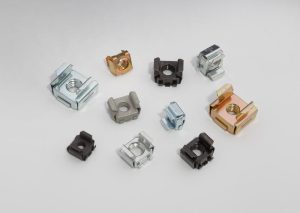
Cage nuts offer a convenient fastening solution for appliances, HVAC equipment, lighting, telecommunication and equipment racks. Also known as clip nuts, they consist of two parts: a square nut and a cage. The cage secures the nut while also allowing it to be clipped into a rack. Once placed in a rack, the cage nut can support a threaded fastener, such as a bolt. If you’re planning to buy a cage nut, however, there are several things to consider.
Material
Not all cage nuts are made of the same material. While they are typically made of metal, you can find them in different types of metals and alloys. Some of them are made of aluminum, whereas others are made of stainless steel or spring steel. Aluminum cage nuts are lightweight and inexpensive, but they lack the strength and durability of their steel counterparts.
Finish
Cage nuts are also available in different finishes. Finishes consist of an outer layer that protects the underlying material from rust and corrosion. Depending on the particular type of finish, it may also improve the cage nut’s aesthetics.
Common finishes for cage nuts include the following:
- Soluble oil
- Phosphate & oil
- Zinc electroplate
- Water-based zinc coating
Thread Size
You should consider the thread size when choosing a cage nut. All cage nuts have a threaded hole in the center. As mentioned above, this allows them to support a threaded fastener, such as a bolt. The size of a cage nut’s threading, however, may vary.
Thread sizes for cage nuts and other fasteners consist of two numbers. The first number represents the thread diameter, whereas the second number represents the threads per inch (TPI). A cage nut with a thread size of 6/32 has a major thread diameter of #6 (3.51 mm) and 32 TPI. It’s important to note that cage nuts are available in both imperial and metric sizes.
Load Requirements
How much weight will the cage nut be supporting? Since they are commonly used in conjunction with heavy equipment, such as servers or appliances, cage nuts are often exposed to a lot of stress.
Fortunately, large cage nuts like M8 or 12/24 can withstand this stress. They are designed to support heavy loads. For lighter applications, on the other hand, an M5 or 10/32 cage nut may suffice.
Rack Compatibility
Something else to consider when choosing a cage nut is rack compatibility. Cage racks are typically installed in racks, such as server racks. But there’s no such thing as a universal cage nut that works with all racks.
